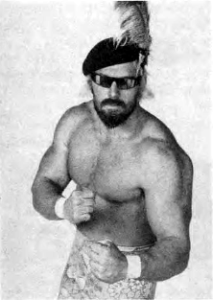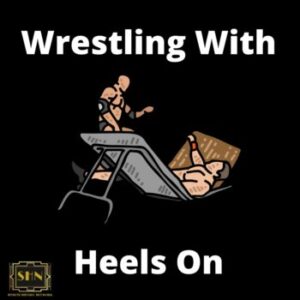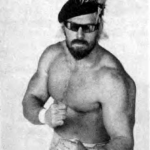One of my favorite audiobooks of 2023 was Matt Singer’s Opposable Thumbs: How Siskel & Ebert Changed Movies Forever. As a lifelong fan of the two film critics, I geeked out on learning about the humble and somewhat shaky origins of their groundbreaking film review show Sneak Previews.
It was also fascinating to learn how much the show’s format—two eminent critics engaged in a verbal duel—inspired other shows to do the same. Political shows like CNN’s Crossfire and the syndicated The McLaughlin Group were now rife with heated crosstalk and contentious debate.
There is no doubt the format was adopted by a lot of other shows too. Unscripted and unpredictable, the format could be counted on to deliver a certain edginess to the audience…if done right. Now I can’t prove this, but I have a sneaking suspicion Vince McMahon took a cue from Siskel & Ebert when he thought of using a heel to do ringside color commentary on his weekly wrestling broadcasts.
The year was 1984 and Vince McMahon was looking to shake things up at the WWF, so this heel had to be a triple threat: quick-witted, opinionated, and charismatic. Enter Jesse “The Body” Ventura. He was all three.
"The Body" Enters The Ring of Broadcsting
Now, regardless of whether McMahon was influenced by the popularity of debate-oriented programs or not, choosing Jesse to be his on-air antagonist was a stroke of genius. Sure, Jesse “The Body” was a flamboyant heel wrestler who wore feathered boas and leopard-print leotards and held a tag team title with equally flamboyant tag team partner Adrian Adonis, but he wasn’t exactly a wrestling mega-star in the ring. I’m sure I’d heard Jesse do promos, but I don’t recall ever being bowled over by anything he said.
Was anybody else in the running for the job? I don’t know, but prior to Jesse, ringside color analysis was mainly Pat Patterson’s job. Pat was semi-retired from the ring at the time and I have to say he was fair to middling as a broadcaster.
That meant McMahon had to do a lot of heavy lifting behind the microphone, calling the action and coloring the drabness of Patterson’s commentary. Sorry to say, but after four years of Patterson’s lackluster work, anybody else sitting next to McMahon was a welcome relief.

Today, of course, it’s hard to imagine that it could have been anybody but Jesse because Jesse is now such a cultural icon. The world knows him as a former mayor and the former governor of Minnesota, an actor in action films like Predator and The Running Man, and the best-selling author of books like: They Killed Our President, Democrips and Rebloodlicans, and American Conspiracies. The world also knows him as a decorated former NAVY SEAL, renowned public speaker, political activist, and podcaster. There’s even talk of Jesse running for office again as a third-party political candidate if there’s still a viable third party out there.
Sure, the world knows Jesse Ventura is quick-witted, charismatic, and opinionated now, but you’d have to have been watching pro wrestling in the beginning of the 80s to catch this rising star at the outset of his broadcasting career. I was lucky enough to listen to him back then and he gave me the courage to have an opinion.
As the new saying goes: opinions are like podcasts—everybody has one. But it’s not enough to be opinionated. There’s an art form to expressing an opinion. As the poet and amateur economist Meenakshi Narayanan writes in her article “The High Art of Expressing Opinions”:
“It’s not just the opinions themselves, but the manner, rationale, and context in which we express them that truly unravels our personality.”

In addition to his powerful persuasive abilities, Jesse was good at promoting the heels he defended on-air, plying heat to those who needed it and extolling those who were already red hot. Some heels desperately needed the extra boost
Jesse’s approval could provide, others not so much. Regardless, everybody benefitted from Jesse’s commentary because WWF broadcasts were now somewhat fair and balanced, if such a phrase can even be applied to pro wrestling at all.
Let’s face it; most of pro-wrestling consists of looking the other way. The referees do it all the time when the rules are being broken. Was a set of brass knuckles used in the ring? Whoops—didn’t see it! And neither did Jesse. He was good at overlooking the rule-breaking and even better at justifying it whenever McMahon called him out on his willful ignorance. This brings us to the why element of expressing an opinion.
As biased as Jesse’s commentary was, he still managed to listen and acknowledge McMahon’s pro-good guy take on everything happening in the ring. In other words, Jesse listened long enough to create the illusion (if indeed it was an illusion) that he and McMahon were having a real heated discussion and didn’t much like each other.
Although the apparent animosity never went beyond some amusing bickering, I could always sense the joy in Jesse’s voice whenever he one-upped McMahon during a verbal exchange (which happened a lot owing to Jesse’s quick thinking). Jesse once remarked his job basically consisted of telling his boss off every week. Now that sounds like a dream job most of us poor working stiffs would love to have.
If the why element is all about the conversation, the where is all about the platform. I can’t imagine watching a sporting competition on TV without commentators. It would be like watching a movie without a music soundtrack.
I need to see the fans, read their clever homemade signs, hear their roars and chants. It’s wrestling, and the opinions expressed usually stay confined to the world of wrestling. And because Jesse never mentioned politics or current events during his color commentary, I didn’t have an inkling politics was in his blood.
Acting, yes, because wrestling is theatre, wrestling is acting, but not politics. Politics has real consequences.
Just because you have a platform doesn’t mean it is the right setting to wade into deeper waters. Jesse eventually moved from the wrestling ring to the political ring, where his heretofore-unknown political opinions found their proper context. Using his former pro-wrestler credentials to boost his outsider standing with voters, Jesse turned his wrestling platform into a springboard for victory.
Siskel & Ebert were talking to moviegoers about movies, and yes, occasionally they expressed their opinions about bigotry, sexism, and violence, but always in the context of the movies they were reviewing, or the film industry in general. And yet, just from the nature of their discourse—passionate and articulate—I could tell Roger and Gene probably held thoughtful opinions on a lot more than just movies.
Turning to Meenakshi Narayanan again, she wrote in her article:
“Beyond these three vital elements, I’ve discovered the elixir of the art of expressing opinions: choosing peace over arguments when a conversation won’t lead to significant change.”
When I was a kid I co-opted the opinions of Jesse Ventura, and Siskel & Ebert and made them my own. Anybody who watched wrestling with me had to hear me echo Jesse’s takes on why the good guy didn’t deserve to win, and how he robbed the supposed “bad guy” of a victory. And like Jesse, I tried to convince my friends the dirty tricks they thought they saw the heel wrestlers do didn’t actually happen. I didn’t convince a single one of them, but over time I became a better debater. And all that meant was I was able to defend opinions that weren’t truly mine.
Anybody who wanted to go to the movies with me had to see what I wanted to see because if the movie hadn’t earned two thumbs up from Siskel & Ebert, I wasn’t going to see it. Through sheer will, I managed to get a few of my friends to begrudgingly go along with my picks. Frankly, it’s a wonder anybody stayed friends with me.
As I grew older and learned to mellow out (for the most part), I became less of a snob. I also became less interested in persuading anybody they were wrong about anything. Any political debating that took place was done in a very sporting manner. If it got out of control, I’d bow out. Let’s agree to disagree is what I say. It is much more important to me today “to choose peace over arguments when a conversation won’t lead to significant change.”
Siskel & Ebert are no longer with us, but I still watch them on YouTube regularly to revisit old reviews. On YouTube, I also watch old interviews of the always-opinionated Frank Zappa and watch old segments of Andy Rooney ranting on the evils of daylight savings time. Opinionated people—those who do it right, anyway—will always have a gravitational pull on my mind. It’s the how, why, and where of their persuasion.
While watching videos of Jesse “The Body” Ventura on YouTube, I felt the same gravitational pull I felt when I was a kid. Jesse was railing on the nation’s two-party political system and the need to overturn it and start over. The more I watched him, the more sense he made. And just like that “The Body” was changing my mind. Like my mother-in-law is fond of saying: “It’s not what you say, it’s how you say it.” I have to remember that one all the time.
On that note, I’ll leave you with a Jesse quote that pretty much sums him up in a nutshell:
JESSE VENTURA: “I speak my mind. If it offends some people, well, there’s not much I can do about that. But I’m going to be honest. I’m going to speak my mind, and that’s who I am.”
Hi everyone. My name is Ariel Gonzalez, originally from Brooklyn, now living in the Garden State and I have a new podcast called “Wrestling With Heels On.”
On the podcast, I get to reminisce about my favorite wrestling bad guys from yesteryear. Light on stats and heavy on nostalgia, this little trip down villainy lane gives me a chance to visit the dark corridors of my wrestling soul, and it’s also fun to have a podcast.

Please Note – As an Amazon Associate I earn from qualifying purchases
Resources
More Wrestling History
Wrestling History: Through The Eyes of a Boomer
This article is an excerpt from SPORTS & BOOMERS: The...
Read More(Jesse) Ventura Highway: How “The Body” Changed My Mind
One of my favorite audiobooks of 2023 was Matt Singer’s Opposable...
Read MoreUnveiling the Real Lives of Wrestling Superstars in “350 Days” Documentary
The most common regret expressed by people before they die...
Read MoreDancing Sheik to Sheik: Blood, Fire, and The Original Sheik
The NEW YOU ASKED FOR IT, a show that ran...
Read More


